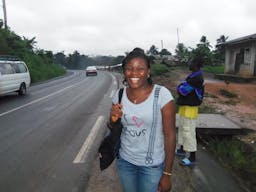The Struggle of the girl child.
Jan 21, 2015
First story
‘A woman has no tribe or religion until she marries’; this is the fate of many beautiful and differently able girls and women around you and I.
Aunty Regina was born to peasant farmers in a far off village in Cameroon many years back. Her parents who were unable to continue to pay her fees after primary 4 sent her to live with an uncle in town. She was to help take care of the house and this uncle was to continue to sponsor her education. The later part of the deal was never executed. Aunty Regina found herself sent to learn a trade and later send off to marriage. Today, the story is yet to change. One of the greatest barriers to education in my community is poverty. In theory, primary education is free in Cameroon but in reality, a lot of money has to be paid as Parent Teacher Associations (PTA) charge exorbitant sums in a bid to provide schools with infrastructure. The government creates schools without structures and these schools are built by the PTA. Girls who are considered the ‘less important sex’ end up being victims of illiteracy because of poverty.
The sending of girls to work as house servants in urban areas is yet another barrier to the education of the girl child. These girls take care of babies and household chores in wealthy families but many end up without even a trade with which to earn a living. 90% of these girls earn about 40-50 dollars (20000-25000FCFA) a month. Some of them suffer sexual harassment, rape and domestic violence in these homes.
Strange enough, some women are barriers to the education of other women. In the just mentioned case, the women who are supposed to encourage their house helps to get an education by sending them to school instead see this as training a rival. Some of the few educated women want to remain the envy of society and therefore are not ready to have other potential female intellectuals.
Aunty Regina is such a product and after 27 years of marriage and having sent all her kids to school, she is doing adult education. ‘Education is a must have for every woman no matter her age’ says aunty Regina.
The lack of access to education of girls and women accounts for the absence of females in important decision making positions like peace processes and development planning.
The most important solution to improving access to education of the girl child in my community is the strengthening of ‘njangi’ groups (meetings held on regular basis). Women come together in these groups to share their problems and joys and contribute money which is given to one or two members each person in her turn. Women have been sensitised through such groups on pertinent issues and income generating activities are also carried out by the women.




